Anxiety is common to all. It is the butterflies in your stomach before that big meeting, the inability to sleep at night due to racing stream of thoughts, or the sudden desire to scrutinize everything. Being a person who is learning to cope with anxiety for years, I figured out that it is sometimes better to learn to cope with it with a tint of playfulness.
Enter the anxiety riddle– no, wait, not that, the funnier way to deal with anxiety, test your brain and perhaps even laugh a bit. Explore similar mental challenges with our psychology riddles to dive deeper into the mind’s intricacies.
Here I have put up more than 125 original anxiety puzzling riddles and solutions, solely to have some fun, provide a learning experience, and provide a new look at moments of anxiety. If you need somewhere to escape in your mind, something to express yourself with or a method to know more about this anxiety that seems to grip so many of us, these riddles are available.
My experience with anxiety has shown me that these tiny exercises of creativity will go a long way. It is time to jump in and see how these riddles can assist us to solve the puzzle of anxiety. For more brain teasers that spark reflection, check out our mysterious riddles.
What Are Anxiety Riddles?
Anxiety riddles are brain teasers that describe the feelings, symptoms, or behaviors associated with anxiety in a metaphorical or abstract way. The goal is to identify the answer—usually “anxiety.” For example:
- Riddle: I’m not a monster, but I can make you feel like one is chasing you. What am I?
Answer: Anxiety
These riddles are not only amusing, they can guide you to consider the problem of anxiety in a different way, diminishing the overwhelming nature of it. They are ideal to be used in a group therapy, personal reflection or even used to break the ice when discussing mental health. To learn more about solving such puzzles effectively, visit our guide to solving riddles like a pro.
Why Use Anxiety Riddles?
You may even ask why one would want to riddle his brain with something like anxiety. And this is the potential worth of the anxiety riddles:
- Distraction: Solving riddles will help foil your head over with things to worry about and this gives a psychological reprieve.
- Perspective: Riddles also assist you to visualize anxiety as a separate entity, and this may be empowering through personification.
- Community: The exchange of riddles may initiate communication and development of bonds with other anxiety people.
- Education: They provide an innovative mode to articulate anxiety to those who do not go through it and allow empathy.
Having worked as a mental health advocate riddles are something I use at my workshops, and they appeal to everyone. They are an innovative method of interaction with anxiety: both mindfull and entertaining. For more on how puzzles benefit mental development, explore why riddles are important for kids’ mental development. For additional health-related brain teasers, try our medical riddles.
Anxiety Riddles by Category
Below, I’ve organized over 125 anxiety riddles into categories to make them easy to explore. Each riddle is original, crafted from my own experiences and research into anxiety’s many facets like the National Institute of Mental Health. Let’s start with the physical symptoms.
Physical Symptoms of Anxiety
These riddles describe the bodily sensations often associated with anxiety, such as a racing heart or sweaty palms. For more health-related puzzles, check out our disease riddles.
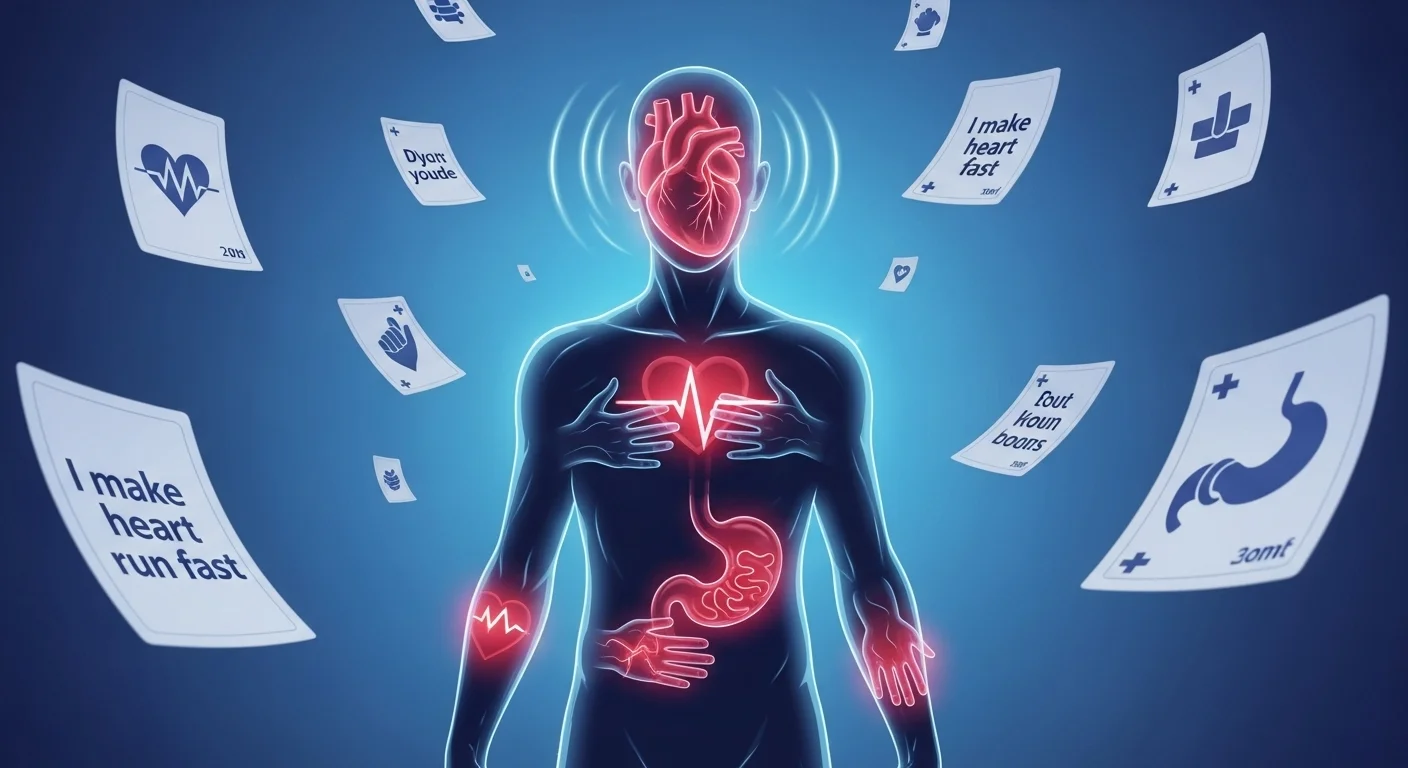
- Riddle: I’m not a race, but your heart runs fast. I’m not a fire, but you feel the heat. What am I?
Hint: This is a common bodily reaction to stress.
Answer: Anxiety
- Riddle: I make your hands shake like leaves in the wind, but there’s no breeze around. What am I?
Hint: It’s a physical sign of nervousness.
Answer: Anxiety
- Riddle: I tie your stomach in knots without any rope. What am I?
Hint: This feeling can make you nauseous.
Answer: Anxiety
- Riddle: I can make you feel like you’re drowning on dry land. What am I?
Hint: It affects your breathing.
Answer: Anxiety
- Riddle: I’m the invisible weight that presses on your chest, making it hard to breathe. What am I?
Hint: It’s a common symptom during panic attacks.
Answer: Anxiety
- Riddle: I can turn your legs to jelly, making you feel unsteady. What am I?
Hint: It’s related to dizziness.
Answer: Anxiety
- Riddle: I’m the cold sweat that breaks out when you’re not hot. What am I?
Hint: It’s a physical response to fear.
Answer: Anxiety
- Riddle: I can make your throat dry and your voice shake, even when you’re not thirsty. What am I?
Hint: It’s a sign of nervousness.
Answer: Anxiety
- Riddle: I’m the flutter in your stomach that feels like butterflies, but there are no insects. What am I?
Hint: It’s a common phrase for nervousness.
Answer: Anxiety
- Riddle: I can make your head spin without you moving. What am I?
Hint: It’s related to dizziness.
Answer: Anxiety
- Riddle: I’m the tightness in your chest that feels like a band around your heart. What am I?
Hint: It’s a physical manifestation of stress.
Answer: Anxiety
- Riddle: I can make you feel hot and cold at the same time, without changing the temperature. What am I?
Hint: It’s a mixed physical response.
Answer: Anxiety
- Riddle: I’m the lump in your throat that makes it hard to swallow, but there’s nothing there. What am I?
Hint: It’s a feeling of constriction.
Answer: Anxiety
- Riddle: I can make your skin crawl, like there are bugs on you, but there are none. What am I?
Hint: It’s a sensation of unease.
Answer: Anxiety
- Riddle: I’m the reason you startle easily, jumping at small sounds. What am I?
Hint: It’s heightened alertness.
Answer: Anxiety
- Riddle: I can make your muscles ache, even when you haven’t exercised. What am I?
Hint: It’s tension-related.
Answer: Anxiety
- Riddle: I’m the dryness in your mouth that makes it hard to speak. What am I?
Hint: It’s a physical sign of nervousness.
Answer: Anxiety
- Riddle: I can make you feel weak in the knees, like you might collapse. What am I?
Hint: It’s a feeling of instability.
Answer: Anxiety
- Riddle: I’m the rapid breathing that makes you feel out of breath. What am I?
Hint: It’s hyperventilation.
Answer: Anxiety
- Riddle: I can cause your vision to blur, even when your eyes are fine. What am I?
Hint: It’s a symptom during high anxiety.
Answer: Anxiety
- Riddle: I’m the numbness or tingling in your fingers and toes, without any injury. What am I?
Hint: It’s a circulatory response.
Answer: Anxiety
- Riddle: I can make you feel like you’re having a heart attack, but your heart is fine. What am I?
Hint: It’s a severe physical symptom.
Answer: Anxiety
Cognitive Aspects of Anxiety
These riddles focus on the mental and emotional experiences of anxiety, like overthinking or self-doubt, as explained by the Anxiety and Depression Association of America.
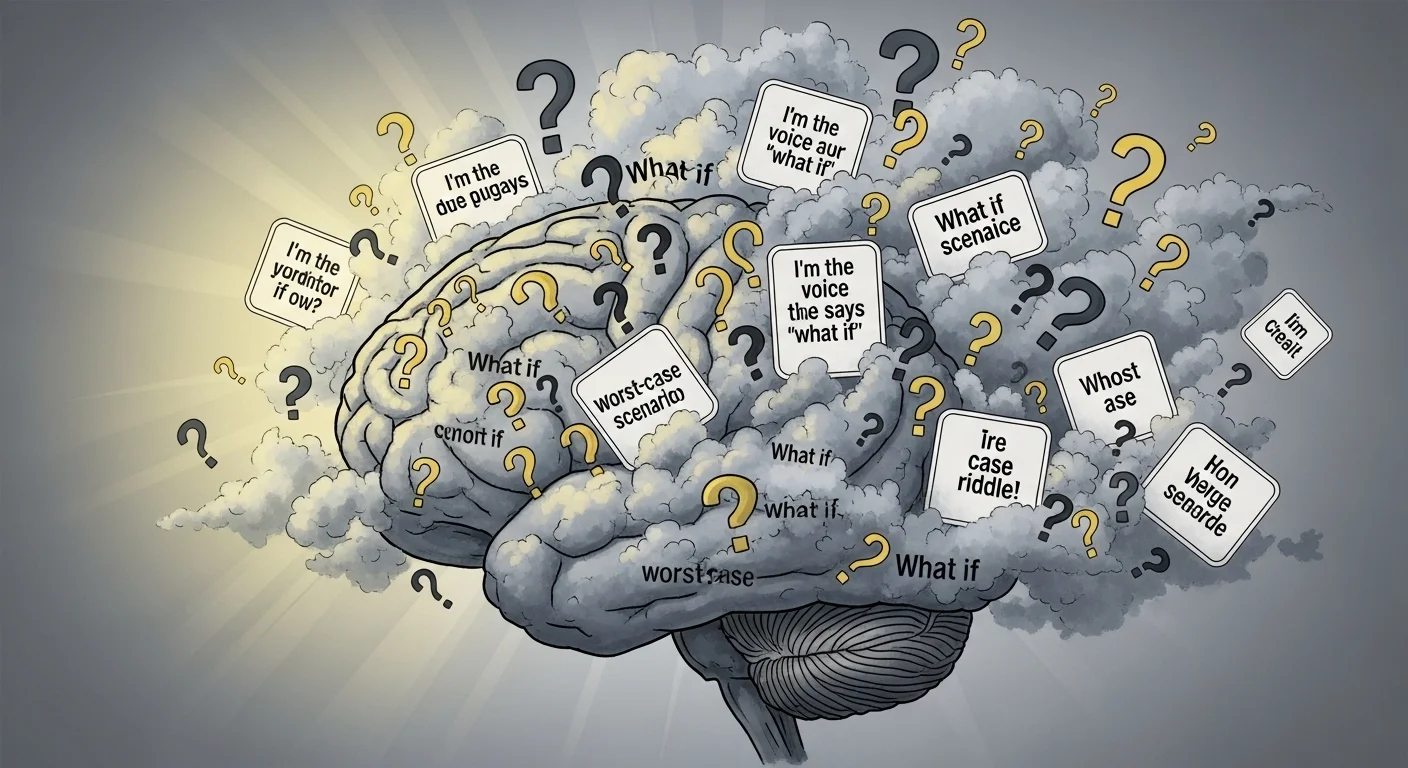
- Riddle: I turn a small worry into a mountain of fear. What am I?
Hint: It’s exaggeration in thinking.
Answer: Anxiety
- Riddle: I’m like a fog that clouds your judgment, making it hard to think clearly. What am I?
Hint: It’s mental confusion.
Answer: Anxiety
- Riddle: I make you second-guess every decision, even the small ones. What am I?
Hint: It’s doubt.
Answer: Anxiety
- Riddle: I’m the doubt that creeps in when you’re trying to be confident. What am I?
Hint: It’s self-doubt.
Answer: Anxiety
- Riddle: I’m a thief that steals your peace of mind, leaving you restless. What am I?
Hint: It’s mental unrest.
Answer: Anxiety
- Riddle: I make you replay conversations in your head, wondering what you could have said differently. What am I?
Hint: It’s rumination.
Answer: Anxiety
- Riddle: I can make you feel like you’re in danger, even when you’re safe. What am I?
Hint: It’s irrational fear.
Answer: Anxiety
- Riddle: I’m the whisper that becomes a shout, filling your mind with fear. What am I?
Hint: It’s escalating thoughts.
Answer: Anxiety
- Riddle: I’m the reason you can’t stop thinking about worst-case scenarios. What am I?
Hint: It’s catastrophizing.
Answer: Anxiety
- Riddle: I make you see problems where there are none, turning molehills into mountains. What am I?
Hint: It’s magnification.
Answer: Anxiety
- Riddle: I’m the filter that makes you focus only on the negative, ignoring the positive. What am I?
Hint: It’s negative bias.
Answer: Anxiety
- Riddle: I convince you that everything is your fault, even when it’s not. What am I?
Hint: It’s personalizing.
Answer: Anxiety
- Riddle: I make you jump to conclusions without evidence. What am I?
Hint: It’s hasty thinking.
Answer: Anxiety
- Riddle: I’m the mental loop that plays the same worries over and over. What am I?
Hint: It’s repetitive thinking.
Answer: Anxiety
- Riddle: I make you feel like you’re losing control of your thoughts. What am I?
Hint: It’s mental chaos.
Answer: Anxiety
- Riddle: I can make simple decisions feel impossible, paralyzing you with indecision. What am I?
Hint: It’s decision-making difficulty.
Answer: Anxiety
- Riddle: I’m the reason you can’t concentrate on tasks, as your mind wanders to worries. What am I?
Hint: It’s distractibility.
Answer: Anxiety
- Riddle: I make you doubt your own memory, questioning if things really happened that way. What am I?
Hint: It’s memory doubt.
Answer: Anxiety
- Riddle: I convince you that you’re not good enough, no matter what you achieve. What am I?
Hint: It’s imposter syndrome.
Answer: Anxiety
- Riddle: I make you fear the future, even when there’s no reason to. What am I?
Hint: It’s future-oriented worry.
Answer: Anxiety
- Riddle: I’m the mental storm that brews inside your head, making it hard to find calm. What am I?
Hint: It’s turbulent thinking.
Answer: Anxiety
- Riddle: I’m the voice that says “what if” over and over again. What am I?
Hint: It’s a common thought pattern.
Answer: Anxiety
Behavioral Responses to Anxiety
These riddles highlight how anxiety influences actions, such as avoidance or overpreparation.
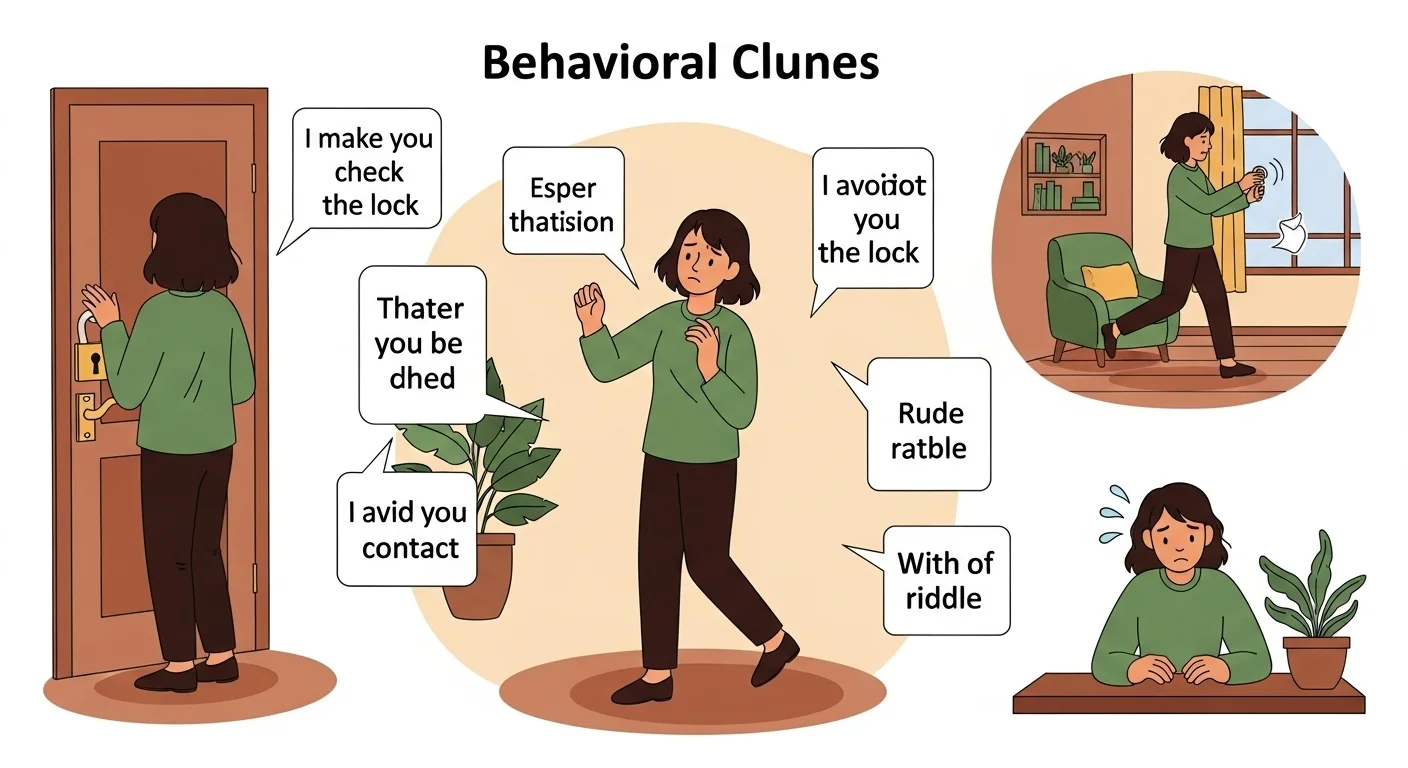
- Riddle: I can make you avoid things you used to enjoy. What am I?
Hint: It’s withdrawal.
Answer: Anxiety
- Riddle: I’m the reason you check the door lock three times before bed. What am I?
Hint: It’s compulsive checking.
Answer: Anxiety
- Riddle: I can make you procrastinate on tasks because they feel overwhelming. What am I?
Hint: It’s delay due to fear.
Answer: Anxiety
- Riddle: I’m the reason you cancel plans last minute, even though you wanted to go. What am I?
Hint: It’s social withdrawal.
Answer: Anxiety
- Riddle: I can make you overprepare for every possible outcome. What am I?
Hint: It’s excessive planning.
Answer: Anxiety
- Riddle: I’m the reason you rehearse conversations in your head before they happen. What am I?
Hint: It’s mental rehearsal.
Answer: Anxiety
- Riddle: I can make you seek reassurance from others constantly. What am I?
Hint: It’s need for validation.
Answer: Anxiety
- Riddle: I’m the reason you avoid eye contact and feel self-conscious in social situations. What am I?
Hint: It’s social anxiety.
Answer: Anxiety
- Riddle: I can make you pace back and forth when you’re worried. What am I?
Hint: It’s restless behavior.
Answer: Anxiety
- Riddle: I’m the reason you double-check emails or texts before sending them. What am I?
Hint: It’s perfectionism.
Answer: Anxiety
- Riddle: I make you bite your nails or twirl your hair when you’re nervous. What am I?
Hint: It’s fidgeting.
Answer: Anxiety
- Riddle: I can make you eat more or less when you’re stressed. What am I?
Hint: It’s appetite change.
Answer: Anxiety
- Riddle: I’m the reason you stay up late, unable to sleep, thinking about tomorrow. What am I?
Hint: It’s insomnia.
Answer: Anxiety
- Riddle: I can make you speak faster or slower than usual when you’re nervous. What am I?
Hint: It’s speech alteration.
Answer: Anxiety
- Riddle: I make you avoid conflict at all costs, even when it’s necessary. What am I?
Hint: It’s conflict avoidance.
Answer: Anxiety
- Riddle: I’m the reason you overthink every decision, big or small. What am I?
Hint: It’s indecisiveness.
Answer: Anxiety
- Riddle: I can make you cling to familiar routines, afraid of change. What am I?
Hint: It’s rigidity.
Answer: Anxiety
- Riddle: I’m the reason you apologize excessively, even when you’re not at fault. What am I?
Hint: It’s people-pleasing.
Answer: Anxiety
- Riddle: I can make you hide your true feelings, wearing a mask of calmness. What am I?
Hint: It’s suppression.
Answer: Anxiety
- Riddle: I make you seek distractions to avoid facing your fears. What am I?
Hint: It’s escapism.
Answer: Anxiety
- Riddle: I’m the reason you overanalyze social cues, looking for signs of disapproval. What am I?
Hint: It’s hypersensitivity.
Answer: Anxiety
- Riddle: I can make you freeze in place when faced with a challenge. What am I?
Hint: It’s immobilization.
Answer: Anxiety
Metaphors for Anxiety
These riddles use vivid imagery to describe anxiety in creative ways.
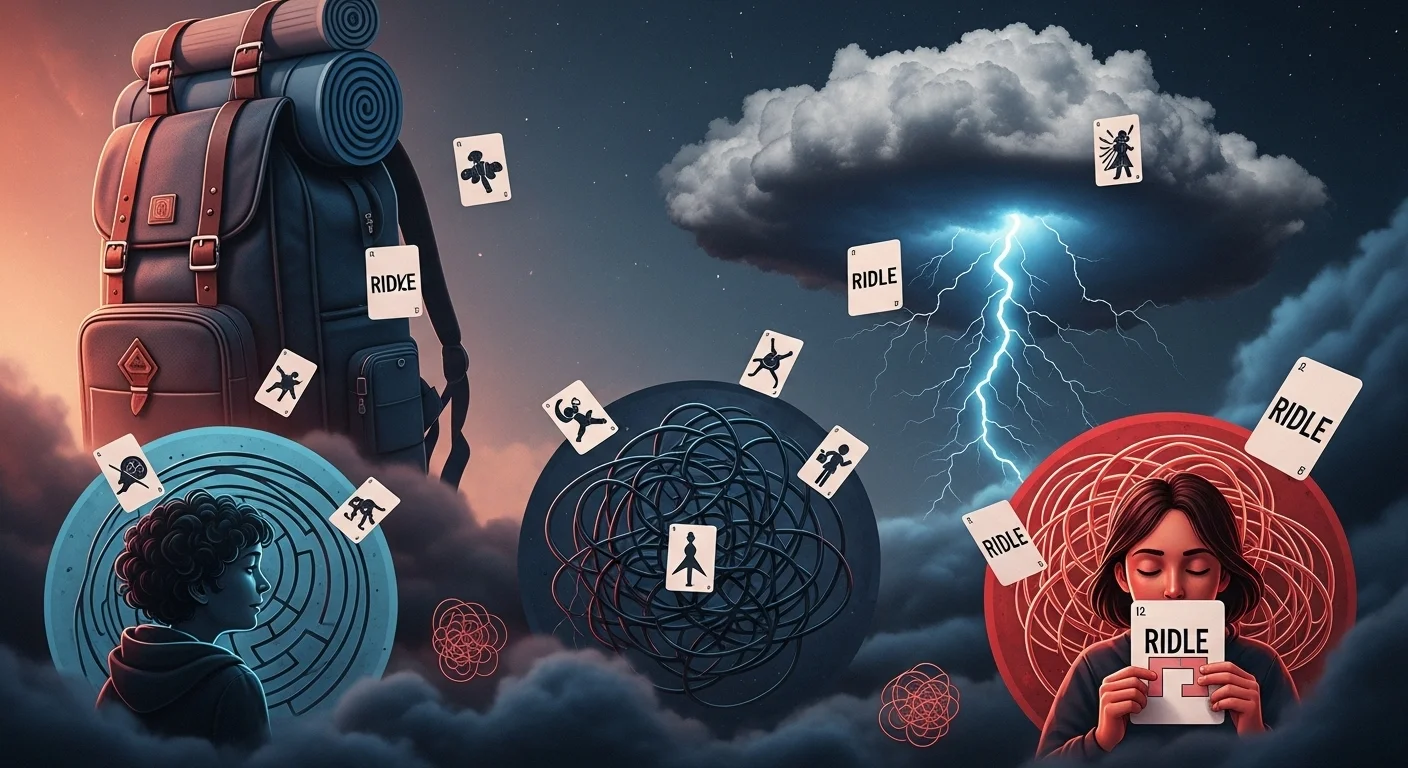
- Riddle: I’m like a shadow that follows you everywhere, whispering doubts in your ear. What am I?
Hint: It’s ever-present.
Answer: Anxiety
- Riddle: I’m a storm in your mind, making it hard to think clearly. What am I?
Hint: It’s turbulent.
Answer: Anxiety
- Riddle: I’m a puzzle with pieces that never quite fit together. What am I?
Hint: It’s confusing.
Answer: Anxiety
- Riddle: I’m a maze with no clear exit, trapping you in endless loops of thought. What am I?
Hint: It’s disorienting.
Answer: Anxiety
- Riddle: I’m a backpack filled with worries that gets heavier with every step. What am I?
Hint: It’s burdensome.
Answer: Anxiety
- Riddle: I’m a clock that ticks louder when you’re trying to relax. What am I?
Hint: It’s intrusive.
Answer: Anxiety
- Riddle: I’m a mirror that distorts your reflection, making you see flaws that aren’t there. What am I?
Hint: It’s deceptive.
Answer: Anxiety
- Riddle: I’m a book with chapters you can’t stop rereading, even though they’re painful. What am I?
Hint: It’s repetitive.
Answer: Anxiety
- Riddle: I’m a song that plays on repeat in your head, but you can’t change the tune. What am I?
Hint: It’s stuck.
Answer: Anxiety
- Riddle: I’m a shadow that grows longer as the day goes on, but it’s not tied to the sun. What am I?
Hint: It’s ever-present.
Answer: Anxiety
- Riddle: I’m a cloud that blocks the sun, even on a clear day. What am I?
Hint: It’s obscuring.
Answer: Anxiety
- Riddle: I’m a knot that tightens the more you try to untie it. What am I?
Hint: It’s persistent.
Answer: Anxiety
- Riddle: I’m a fog that settles in your mind, making everything unclear. What am I?
Hint: It’s confusing.
Answer: Anxiety
- Riddle: I’m a whisper that turns into a shout, echoing in your thoughts. What am I?
Hint: It’s amplifying.
Answer: Anxiety
- Riddle: I’m a chain that binds you to your fears, limiting your freedom. What am I?
Hint: It’s restrictive.
Answer: Anxiety
- Riddle: I’m a darkness that lurks at the edges of your vision, always there. What am I?
Hint: It’s looming.
Answer: Anxiety
- Riddle: I’m a wave that crashes over you, leaving you breathless. What am I?
Hint: It’s overwhelming.
Answer: Anxiety
- Riddle: I’m a labyrinth with no map, where every turn leads to more confusion. What am I?
Hint: It’s complex.
Answer: Anxiety
- Riddle: I’m a weight that presses down on you, making it hard to stand tall. What am I?
Hint: It’s heavy.
Answer: Anxiety
- Riddle: I’m a thief that steals your joy, leaving only worry behind. What am I?
Hint: It’s depleting.
Answer: Anxiety
- Riddle: I’m a monster under the bed that you know isn’t real, but still scares you. What am I?
Hint: It’s imaginary but powerful.
Answer: Anxiety
- Riddle: I’m a broken record that keeps playing the same fearful tune. What am I?
Hint: It’s repetitive.
Answer: Anxiety
Lighthearted and Humorous Anxiety Riddles
These riddles add a touch of humor to lighten the mood around anxiety.
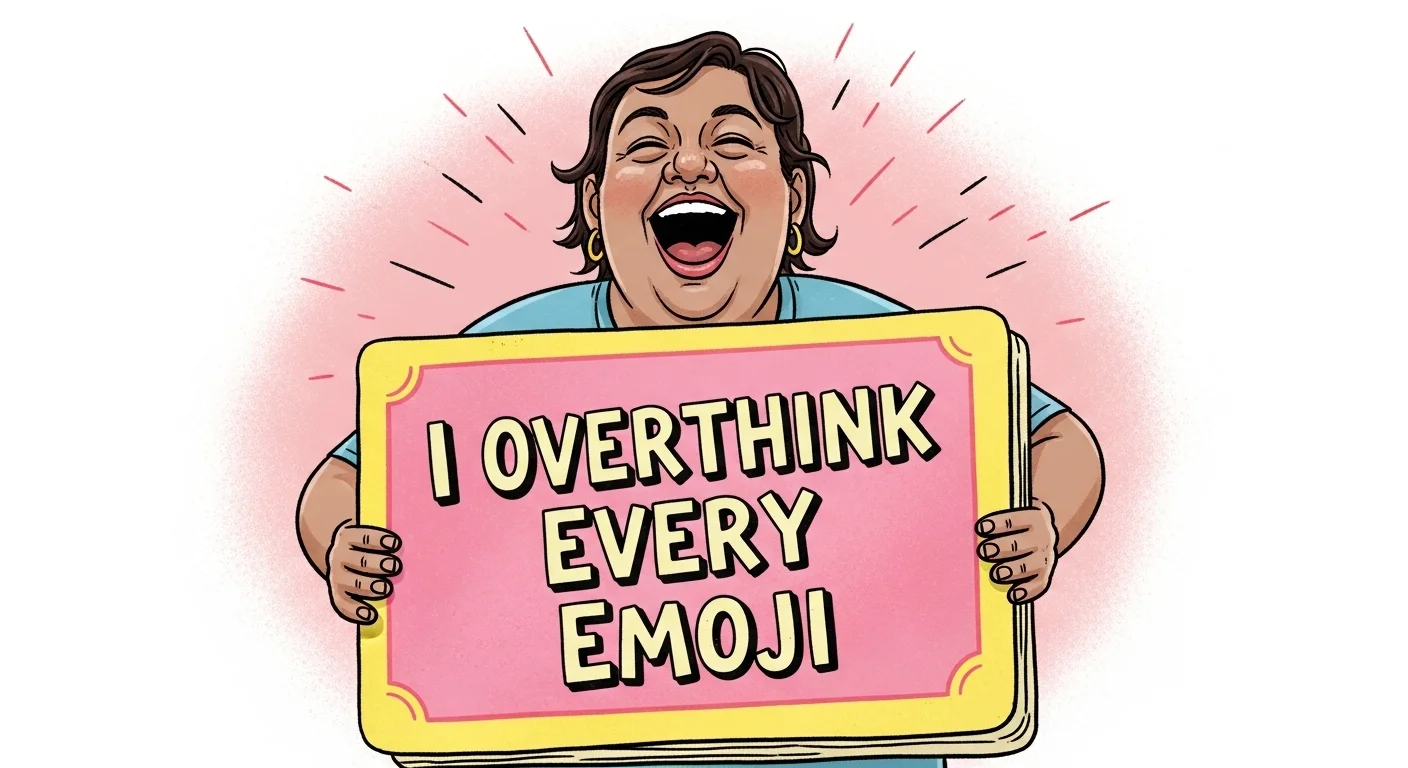
- Riddle: I’m the reason you laugh nervously in awkward situations. What am I?
Hint: It’s a social response.
Answer: Anxiety
- Riddle: I’m like a clingy friend who won’t leave you alone, even when you’re trying to relax. What am I?
Hint: It’s persistent.
Answer: Anxiety
- Riddle: I’m the reason you overthink every emoji you send in a text. What am I?
Hint: It’s excessive analysis.
Answer: Anxiety
- Riddle: I’m the invisible guest at every party who makes you feel out of place. What am I?
Hint: It’s social discomfort.
Answer: Anxiety
- Riddle: I’m the reason you practice your handshake before meeting someone new. What am I?
Hint: It’s preparation for interaction.
Answer: Anxiety
- Riddle: I’m like a bad comedian who keeps telling the same joke—your worries—over and over. What am I?
Hint: It’s repetitive.
Answer: Anxiety
- Riddle: I’m the reason you triple-check your coffee order to make sure it’s perfect. What am I?
Hint: It’s perfectionism.
Answer: Anxiety
- Riddle: I’m the backseat driver of your mind, constantly telling you to worry about everything. What am I?
Hint: It’s intrusive thoughts.
Answer: Anxiety
- Riddle: I’m the reason you rehearse your order at a drive-thru before you even get there. What am I?
Hint: It’s overpreparation.
Answer: Anxiety
- Riddle: I’m like a bad roommate who leaves their mess—your worries—all over the place. What am I?
Hint: It’s messy thinking.
Answer: Anxiety
- Riddle: I’m the reason you apologize to your pet for something that wasn’t your fault. What am I?
Hint: It’s excessive guilt.
Answer: Anxiety
- Riddle: I’m the voice that says “did you lock the door?” even though you know you did. What am I?
Hint: It’s doubt.
Answer: Anxiety
- Riddle: I’m the reason you check your phone every five minutes, waiting for a reply. What am I?
Hint: It’s impatience and worry.
Answer: Anxiety
- Riddle: I’m like a pop-up ad in your brain, interrupting your thoughts with worries. What am I?
Hint: It’s intrusive.
Answer: Anxiety
- Riddle: I’m the reason you start a sentence with “I’m sorry” even when you’re not sorry. What am I?
Hint: It’s habitual apologizing.
Answer: Anxiety
- Riddle: I’m like a GPS that keeps recalculating, but you’re not going anywhere. What am I?
Hint: It’s indecision.
Answer: Anxiety
- Riddle: I’m the reason you bring an umbrella on a sunny day, just in case. What am I?
Hint: It’s precautionary.
Answer: Anxiety
- Riddle: I’m like a broken record, but instead of music, it’s “what if” scenarios. What am I?
Hint: It’s repetitive worrying.
Answer: Anxiety
- Riddle: I’m the reason you read the fine print on every contract, even the ones for free trials. What am I?
Hint: It’s caution.
Answer: Anxiety
- Riddle: I’m like a security system that’s always on high alert, even in safe places. What am I?
Hint: It’s hypervigilance.
Answer: Anxiety
- Riddle: I’m the reason you set multiple alarms, afraid you’ll oversleep. What am I?
Hint: It’s fear of missing out.
Answer: Anxiety
- Riddle: I’m like a weather app that always predicts storms, even when the sky is clear. What am I?
Hint: It’s pessimistic forecasting.
Answer: Anxiety
Additional Riddles
These riddles cover general or unique aspects of anxiety that don’t fit neatly into other categories.
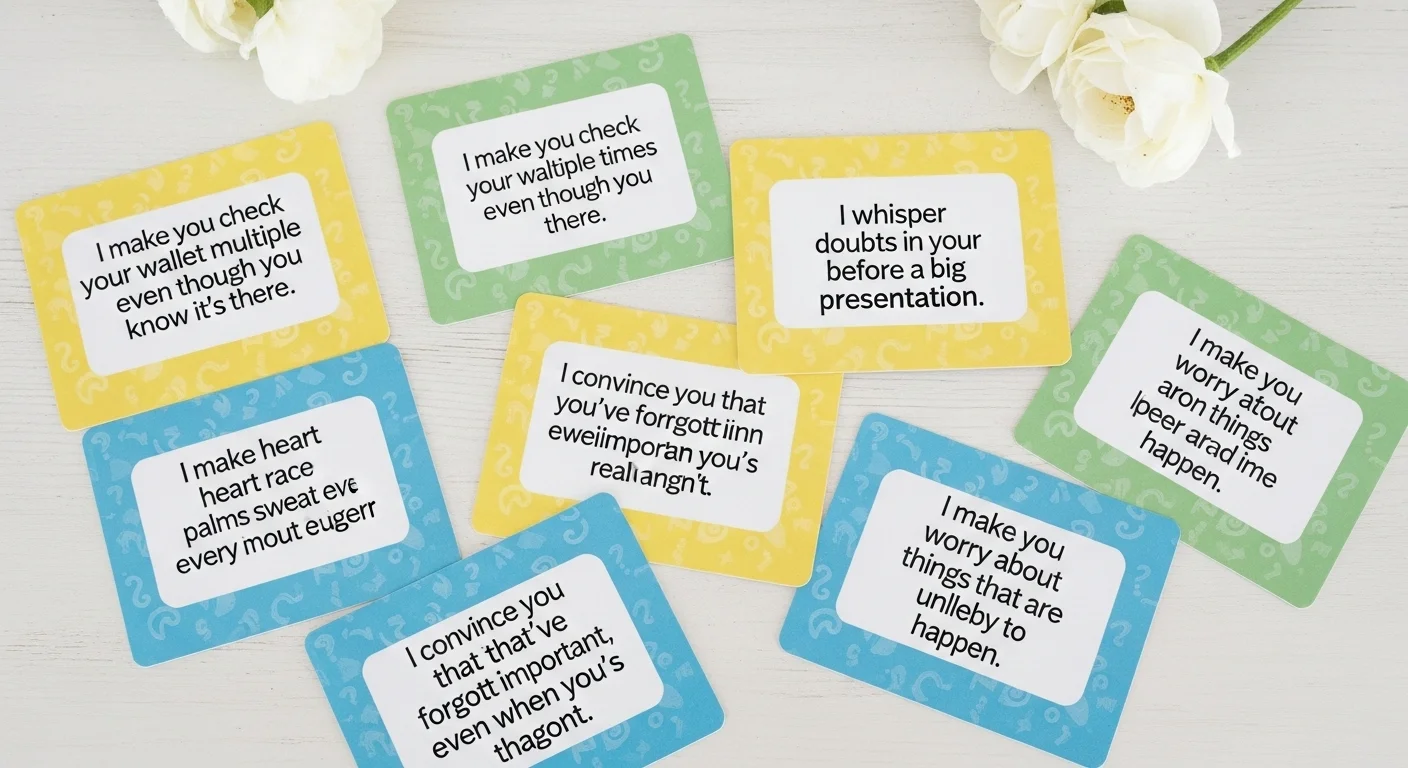
- Riddle: I’m the feeling that makes you check your wallet multiple times to ensure your ID is still there. What am I?
Hint: It’s a habit driven by worry.
Answer: Anxiety
- Riddle: I’m the reason you arrive early to appointments, fearing you’ll be late. What am I?
Hint: It’s punctuality driven by fear.
Answer: Anxiety
- Riddle: I make you second-guess if you turned off the stove, even though you remember doing it. What am I?
Hint: It’s doubt.
Answer: Anxiety
- Riddle: I’m the feeling that makes you avoid checking your bank account, afraid of what you’ll see. What am I?
Hint: It’s financial worry.
Answer: Anxiety
- Riddle: I’m the reason you keep your phone on loud, in case someone needs you urgently. What am I?
Hint: It’s availability anxiety.
Answer: Anxiety
- Riddle: I make you overthink every word in a conversation, analyzing for hidden meanings. What am I?
Hint: It’s social analysis.
Answer: Anxiety
- Riddle: I’m the feeling that makes you avoid trying new foods, fearing you won’t like them. What am I?
Hint: It’s neophobia.
Answer: Anxiety
- Riddle: I make you hesitate before posting anything online, worried about judgment. What am I?
Hint: It’s social media anxiety.
Answer: Anxiety
- Riddle: I’m the reason you keep spare keys in multiple places, just in case. What am I?
Hint: It’s preparedness.
Answer: Anxiety
- Riddle: I make you feel guilty for taking a break, like you should always be productive. What am I?
Hint: It’s work anxiety.
Answer: Anxiety
- Riddle: I’m the feeling that makes you avoid confrontations, even when you’re right. What am I?
Hint: It’s conflict avoidance.
Answer: Anxiety
- Riddle: I make you check the weather forecast multiple times a day. What am I?
Hint: It’s weather worry.
Answer: Anxiety
- Riddle: I’m the reason you keep a list of things to do, even for trivial tasks. What am I?
Hint: It’s obsessive organization.
Answer: Anxiety
- Riddle: I make you worry about saying the wrong thing in a group chat. What am I?
Hint: It’s social communication fear.
Answer: Anxiety
- Riddle: I’m the feeling that makes you double-check if you replied to an important email. What am I?
Hint: It’s fear of oversight.
Answer: Anxiety
- Riddle: I make you feel like you’re forgetting something important, even when you’re not. What am I?
Hint: It’s nagging doubt.
Answer: Anxiety
- Riddle: I’m the reason you avoid crowded places, fearing you’ll feel trapped. What am I?
Hint: It’s claustrophobic worry.
Answer: Anxiety
- Riddle: I make you rehearse your speech in your head before a meeting. What am I?
Hint: It’s preparation anxiety.
Answer: Anxiety
- Riddle: I’m the feeling that makes you check your bag for your keys, even when you feel them inside. What am I?
Hint: It’s compulsive checking.
Answer: Anxiety
- Riddle: I make you worry about missing a deadline, even when it’s weeks away. What am I?
Hint: It’s time pressure.
Answer: Anxiety
- Riddle: I’m the reason you avoid taking risks, fearing failure. What am I?
Hint: It’s risk aversion.
Answer: Anxiety
- Riddle: I make you feel like you’re always one step behind, even when you’re on track. What am I?
Hint: It’s a sense of inadequacy.
Answer: Anxiety
My Experience with Anxiety and Riddles
In my experience as a mental health advocate, I have dedicated years to seeking means through which to overcome anxiety both personally, and with centers that I work in. I can recall my first panic attack rather clearly, I was out shopping, and became short of breath and my heart pounded, as I felt myself being pushed to the walls of the store.
I have discovered, through the course of time that riddles and other such creative exercises in fact are an unexpected lifeline. They provide my thoughts with something to concentrate on so that anxiety becomes a puzzle to solve as opposed to a force that dictates to me. This is visibly when people in my workshops, have a little breakthrough when they solve one of my riddles, one gets a sense of relief and understanding.
These encounters led them to inspire me to come up with this collection and I sincerely hope you will find a connection with it too.
How Riddles Compare to Other Anxiety Tools
Anxiety puzzles are not substitutes to professional help, and can only be used as an add-on to other tactics. Here’s how they stack up, with insights from Mayo Clinic’s guide to anxiety management:
| Method | Benefits | Limitations |
| Anxiety Riddles | Fun, engaging, promotes reflection, fosters community, accessible to all ages | Not a treatment, may not suit everyone, requires mental focus |
| Mindfulness Exercises | Reduces stress, improves focus, evidence-based (e.g., ADAA) | Can be challenging for beginners, requires practice |
| Cognitive-Behavioral Therapy (CBT) | Highly effective, addresses root causes, long-term benefits (NIMH) | Requires professional guidance, time-intensive, may not be immediately accessible |
| Exercise | Boosts mood, reduces physical symptoms, widely accessible (Mayo Clinic) | May not address cognitive aspects, requires physical effort |
Riddles are a quick, creative tool for anxious moments, complementing evidence-based approaches like CBT, as supported by Harvard Health.
Conclusion
Anxiety riddles aren’t merely puzzles, they’re playful, and empowering, interactions with a difficult emotion. They are not cut-ins ideally, but they provide these little bright spots, they give the chance of perspective, humor, and relation. I have over five years of experience in blogging about mental health; thus, I have witnessed the impact little tools such as these provoke.
Why not have a go at one of these conundrums now? Please discuss your favorite in the comments or make your own to contribute!
Frequently Asked Questions (FAQs)
What is the best question for anxiety?
Asking “What’s the worst that could happen, and can I handle it?” can help put anxious thoughts into perspective, encouraging a more rational approach to worry, per Psychology Today.
What is the 5 anxiety trick?
The 5-4-3-2-1 grounding technique involves identifying 5 things you see, 4 you can touch, 3 you hear, 2 you smell, and 1 you taste. It’s a quick way to anchor yourself in the present (ADAA).
What is the 3 3 3 trick for anxiety?
The 3-3-3 rule asks you to name 3 things you see, 3 sounds you hear, and move 3 body parts. This helps distract from anxious thoughts and reconnect with your surroundings.
What are 10 facts about anxiety?
1. Anxiety is the most common mental health disorder, affecting millions worldwide.
2. It can stem from genetics, environment, or psychological factors.
3. Types include generalized anxiety disorder, panic disorder, and social anxiety.
4. Physical symptoms include rapid heart rate, sweating, and trembling.
5. Cognitive-behavioral therapy (CBT) is a highly effective treatment (NIMH).
6. Mindfulness can reduce anxiety symptoms.
7. Exercise is a proven way to alleviate anxiety.
8. Anxiety often coexists with depression.
9. Professional help is crucial if anxiety disrupts daily life.
10. Self-care, like sleep and nutrition, supports anxiety management.
Why am I so riddled with anxiety?
Anxiety can arise from genetics, brain chemistry, personality, or life events. Consulting a mental health professional can help identify causes and develop tailored strategies.
